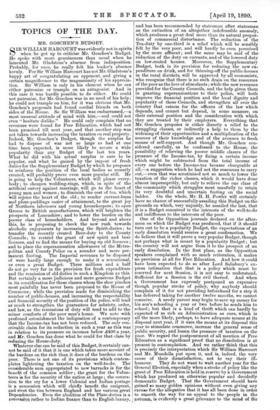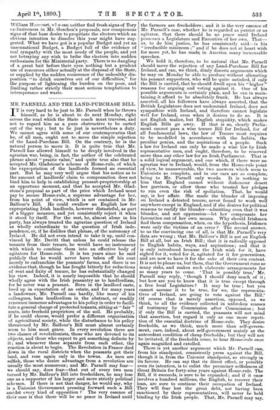TOPICS OF THE DAY.
MR GOSCHEN'S BUDGET.
SIR WILLIAM HARCOITRT was evidently not in spirits when he got up to criticise Mr. Goschen's Budget. He spoke with more genuineness than usual when he lamented Mr. Gladstone's absence from indisposition. Probably, for once, he really felt his leader's absence keenly. For Sir William Harcourt has not Mr. Gladstone's happy art of congratulating an opponent, and giving a certain magnificence to the magnanimity of his apprecia- tion. Sir William is only in his element when he can either patronise or trample on an antagonist. And in this case it was hardly possible, to do either. He could not patronise, for Mr. Goschen was in no need of his help ; he could not trample on him, for it was obvious that Mr. Goschen's proposals had found cordial friends on both sides of the House. So Sir William was embarrassed,—a most unusual attitude of mind with him,—and could not even "hesitate dislike." He could only complain that no revenues were found for Free Education, which had not been promised till next year, and that another step was not taken towards increasing the taxation on real property. Indeed, Mr. Goschen's Budget, though the surplus he had to dispose of was not so large as had at one time been expected, is more likely to secure a wide popularity than any Budget of the last ten years. What he did with his actual surplus is sure to be popular, and what he gained by the impost of fresh duties for the Supplementary Budget by which he proposes to reinforce the position of the local bodies so recently created, will probably prove even more popular still. He is going to help the Volunteers, which will please every- body ; to cheapen wedding-rings, which, in spite of the artificial outcry against marriage, will go to the heart of young men and women ; to diminish the cost of tea, which will rejoice the heart of the old ; to render currant-buns and plum-puddings easier of attainment, to the great joy of Northern labourers and young housekeepers ; to open Greece to British manufacturers, which will brighten the prospects of Lancashire ; and to lower the burden on the poorer class of householders. And beyond and above this, he is proposing to check the new rush towards alcoholic enjoyments by increasing the Spirit-duties ; to transfer the recently created Beer-duty to the County Councils ; to restrict the grant of new spirit and beer licences, and to find the means for buying up old licences ; and to place the superannuation allowances of the Metro- politan and County Police on a sounder and more per- manent footing. The Imperial revenues to be disposed of were hardly large enough to make it a sensational, or even a great Budget. Three millions and a half do not go very far in the provision for fresh expenditure and the remission of old duties in such a Kingdom as this. But certainly a more judicious and more generous Budget in its consideration for those classes whom the shoe pinches most painfully has never been proposed to the House of Commons ; while the provision made for diminishing the number of public-houses, and increasing the respectability and financial security of the position of the police, will tend as much to strengthen the guarantees for sobriety, order, and law, as the remissions of duty will tend to add to the minor comforts of the poor man's home. We note with profound astonishment the indignation of a contemporary that the Income-tax has not been reduced. The only con- ceivable claim for its reduction in such a year as this was in relation to its pressure on incomes below £400 a year, and Mr. Goschen has done what he could for that class by reducing the House-duty. Whatever else can be said of this Budget, it certainly can- not be said of it that it is one which takes more account of the burdens on the rich than it does of the burdens on the poor. There is not one of its provisions which contem- plates lightening the taxation on the well-to-do. The considerable sum appropriated to new barracks is for the benefit of the common soldier ; the grant for the Volun- teers is for the security of the nation at large ; the conces- sion to the cry for a lower Colonial and Indian postage is a concession which will chiefly benefit the emigrant, and rivet the ties between England and her various great Dependencies. Even the abolition of the Plate-duties is a concession TAther to Indian finance than to Nnglish luxury, and has been recommended by statesman after statesman as the extinction of an altogether indefensible anomaly, which produces a great deal more than its natural propor- tion of commercial disturbance. The reduction of the Tea-duty by one-third is a relief which will be sensibly felt by the very poor, and will hardly be even perceived by the more affluent; and the same may be said of the reduction of the duty on currants, and of the lowered duty on low-rented houses. Moreover, the Supplementary Budget, both in its provision for reducing the new ex- penditure on drink, and for thinning-off the public-houses in the rural districts, will be approved by all economists, who recognise that there is no such drain on the resources of the poor as the love of stimulants ; while the new revenues. provided for the County Councils, and the help given them in granting superannuations to their police, will both improve the financial position and the local dignity and popularity of these Councils, and strengthen all over the country that esteem for the officers of the law which depends, and cannot but depend, in some measure, on their external position and the consideration with which they are treated by their employers. Everything that Mr. Goschen proposes is either directly a relief to the struggling classes, or indirectly a help to them by the widening of their opportunities and a multiplication of the sources of their knowledge and of the avenues to fresh means of self-support. And though Mr. Goschen con- sidered carefully, as he confessed to the House, the possibility of relieving the poorer middle classes of the pressure of the Income-tax, by fixing a certain income which might be subtracted from the total income of every one before the Income-tax became chargeable at all,—a suggestion which he had not the resources to carry out,—even that was scrutinised not so much to lower the taxation of the richer classes, which it would have done almost imperceptibly, but only to relieve the one class of the community which struggles most manfully to retain its very doubtful and uncertain footing on the social ladder. On the whole, Mr. H. H. Fowler will certainly have no chance of successfully assailing this Budget on the grounds on which, very unjustly, he assailed the last, that it is a Budget conceived in the interests of the well-to-do and indifferent to the interests of the poor. One of the Opposition journals declared on the after- noon on which the Budget was produced, that if it should turn out to be a popularity Budget, the expectations of an early dissolution would receive a great confirmation. We do believe that it will prove a very popular Budget, though not perhaps what is meant by a popularity Budget ; but the country will not argue from it to the prospect of an early dissolution. In the first place, as the Opposition speakers complained with so much reiteration, it makes no provision at all for Free Education. And how it could have been expected to do so after Lord Salisbury's ex- press intimation that that is a policy which must be reserved for next Session, it is not easy to understand. Sufficient for a Session is the evil thereof. And when a Government has expressly postponed an expensive though popular stroke of policy, why anybody should complain of it for not providing beforehand for a step it has deferred taking for another twelve months, we cannot conceive. A needy parent may begin to save up money for his son's schooling a year or two before he sends him to school ; but that is a kind of thrift which can hardly be expected of so rich an Administration as ours, which is all the more likely, perhaps, to have adequate means at its disposal next year, if it uses the means at its disposal this year to stimulate commerce, increase the general sense of public security, and lessen the pressure of taxation on the poor. We regard the postponement of all mention of Free Education as a significant proof that no dissolution is at present in contemplation. And we rather think that this is precisely the interpretation which Sir William Harcourt and Mr. Mundella put upon it, and is, indeed, the very cause of their dissatisfaction, not to say their ill- humour. They do not want to wait another year for the General Election, especially when a stroke of policy like the grant of Free Education is held in reserve by a Government which has produced an otherwise popular and decidedly democratic Budget. That the Government should have gained so many golden opinions without even giving any excuse for the allegation that it has all been done in order to smooth the way for an appeal to the people in the autumn, is evidently a great grievance to the mind of Sir William Harcourt, wl o can ueither find fresh signs of Tory exclusiveness in Mr. Goschen's proposals, nor conspicuous signs of that base desire to propitiate the electors which an obvious intention to dissolve this year might have sug- gested. What we have got is a popular Budget and yet an unsensational Budget, a Budget full of the evidence of real sympathy with the most needy of the people, and yet not betraying any wish to bribe the electors into sudden enthusiasm for the Ministerial party. There is no dangling of a great bait before their eyes. nothing but a prudent use of resources either actually at the disposal of the State, or supplied by the sudden recurrence of the unhealthy dis- position "to drink ourselves out of our difficulties," for the purpose of lightening the burden on the poor, and limiting rather strictly their most serious temptations to intemperance and waste.



















































 Previous page
Previous page